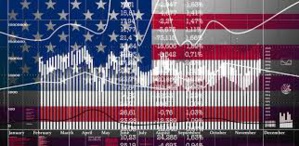The sluggish performance early in the year was temporary could be confirmed in the second quarter as consumers ramped up spending and businesses invested more on equipment and hence the U.S. economy is likely accelerated.
According to a Reuters survey of economists, there has been a probable increase of 2.6 percent annual rate in the April-June period in the gross domestic product. But on Thursday a survey showed a sharp drop in the goods trade deficit in June and strong gains in wholesale and retail inventories and the poll was conducted before the release of that data.
The Federal Reserve would be on course to raise interest rates for a third time this year and announce a plan to start reducing its $4.2 trillion portfolio of Treasury bonds and mortgage-backed securities in September by a rebound in growth, together with a tightening labor market.
"The Fed is certainly looking for a rebound in the strength of GDP growth that maintains the moderate economic expansion we have seen during this current economic cycle," said Sam Bullard, a senior economist at Wells Fargo Securities in Charlotte, North Carolina. "That would allow plans for further monetary policy tightening."
The U.S. central bank said it expected to start winding down its portfolio "relatively soon" and left rates unchanged on Wednesday.
It will probably not exceed 2.5 percent for the full year even if GDP growth regains momentum in the second quarter. An ambitious 3.0 percent growth target for 2017 was set by President Donald Trump.
Republicans' struggles in Congress to pass a healthcare restructuring have left analysts skeptical on the prospects of fiscal stimulus even while the Trump administration has vowed to cut corporate and individual taxes as part of its business-friendly agenda. So far, neither business nor consumer confidence has been hit by the impasse in Washington.
For the bulk of the pickup in economic growth in the second quarter, a resurgence in consumer spending likely to be the reason. There was a 1.1 percent rate in the first quarter, the weakest performance in a year, in consumer spending, which accounts for more than two-thirds of the U.S. economy.
"I am a little worried about the consumer in the second half of this year because of the lack of wage growth," said Ryan Sweet, senior economist at Moody's Analytics in Westchester, Pennsylvania. "For consumers to continue to lead the economy we need wage growth to accelerate."
From the first quarter's 7.8 percent rate, marking a third straight quarterly increase, business spending on equipment is expected to have picked up. Another boost to GDP growth in the second quarter is likely to be provided by investment on nonresidential structures like oil and gas wells.
They appeared to spend more in some places while businesses probably continued to carefully manage their inventories. After slicing off 1.1 percent percentage points in the first quarter , inventory investment is expected to have been neutral or made a modest contribution to growth.
(Source:www.reuters.com)
According to a Reuters survey of economists, there has been a probable increase of 2.6 percent annual rate in the April-June period in the gross domestic product. But on Thursday a survey showed a sharp drop in the goods trade deficit in June and strong gains in wholesale and retail inventories and the poll was conducted before the release of that data.
The Federal Reserve would be on course to raise interest rates for a third time this year and announce a plan to start reducing its $4.2 trillion portfolio of Treasury bonds and mortgage-backed securities in September by a rebound in growth, together with a tightening labor market.
"The Fed is certainly looking for a rebound in the strength of GDP growth that maintains the moderate economic expansion we have seen during this current economic cycle," said Sam Bullard, a senior economist at Wells Fargo Securities in Charlotte, North Carolina. "That would allow plans for further monetary policy tightening."
The U.S. central bank said it expected to start winding down its portfolio "relatively soon" and left rates unchanged on Wednesday.
It will probably not exceed 2.5 percent for the full year even if GDP growth regains momentum in the second quarter. An ambitious 3.0 percent growth target for 2017 was set by President Donald Trump.
Republicans' struggles in Congress to pass a healthcare restructuring have left analysts skeptical on the prospects of fiscal stimulus even while the Trump administration has vowed to cut corporate and individual taxes as part of its business-friendly agenda. So far, neither business nor consumer confidence has been hit by the impasse in Washington.
For the bulk of the pickup in economic growth in the second quarter, a resurgence in consumer spending likely to be the reason. There was a 1.1 percent rate in the first quarter, the weakest performance in a year, in consumer spending, which accounts for more than two-thirds of the U.S. economy.
"I am a little worried about the consumer in the second half of this year because of the lack of wage growth," said Ryan Sweet, senior economist at Moody's Analytics in Westchester, Pennsylvania. "For consumers to continue to lead the economy we need wage growth to accelerate."
From the first quarter's 7.8 percent rate, marking a third straight quarterly increase, business spending on equipment is expected to have picked up. Another boost to GDP growth in the second quarter is likely to be provided by investment on nonresidential structures like oil and gas wells.
They appeared to spend more in some places while businesses probably continued to carefully manage their inventories. After slicing off 1.1 percent percentage points in the first quarter , inventory investment is expected to have been neutral or made a modest contribution to growth.
(Source:www.reuters.com)






